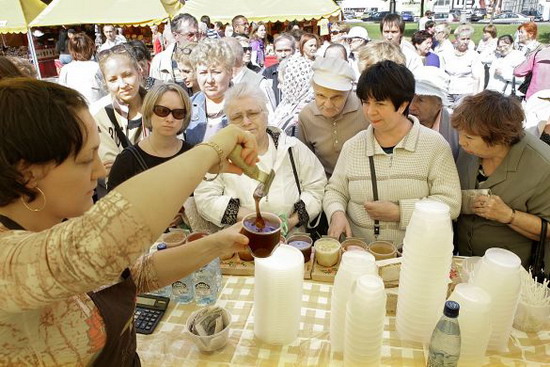
Entrepreneurs worry that small business faces a dismal future after an increase in taxes and utilities at the start of this year.
"It's a sad situation," Russian Association of Small and Medium Enterprises president Alexander Ioffe said at the National Institute of Systematic Research of Enterprise Problems fifth annual forum. "We are moving backwards, we should be crying."
Many businesses are struggling to afford the 8 percentage point social tax hike, from 26 to 34 percent, that went into effect Jan. 1. On top of the tax increase, the cost of utilities has gone up with inflation.
Marzhanat Ibragimova, chairwoman of the enterprise council of Kizlyar, a small city in the republic of Dagestan, said 70 percent of local businesses have shut down since the beginning of the year because they cannot pay the tax. There is no help available from the regional government.
"Everybody is closing, we don't make the profit to pay that much," Ibragimova said. "Our young people are not working."
Other regions face a similar fate. Several bakeries have shut down, and more are slated to close in the Amur region, head of the region's enterprise council Oksana Stepanova said.
Russia has about 1.2 million small enterprises for a population of 142 million and an area of 17.1 million square kilometers. Small business provides about 20 percent of the country's gross domestic income. This number has stayed roughly the same for nearly 20 years.
Russia's much smaller neighbor Poland has about 27 percent of Russia's population, yet there are 4 million small businesses and the country receives more than 60 percent of its gross domestic product from them.
The increased tax seems to go against the government's rhetoric to develop small business.
The federal budget sets aside 2 billion rubles ($69 million) a year for small business development, and each region is supposed to provide additional financing. But only a small portion of business owners actually get the money. Financing for small business in Moscow has been frozen since January.
One reason many businesses don't get government help is a lack of information about services, institute vice president Maxim Gromov said.
The Economic Development Ministry has offered electronic registration of land, online maps and other services on its web site since the beginning of this year. The Federal Anti-Monopoly Service has increased its web presence in an effort to stop government agencies from outsourcing their services to private firms for kickbacks.
Nongovernmental institutions also provide information services to accelerate small business growth. The U.S. Russia Center for Entrepreneurship trains business leaders, and the National Institute of Systematic Research of Enterprise Problems conducts research on small business. Associations organize forums and seminars.
Corruption is another major hurdle for companies.
For example, the list of fire safety requirements is very long and almost impossible to fulfill. Most companies pay unofficial fines to get approved.
Another issue is securing credit. Business owners complain about either high interest or unaffordable kickbacks.
Administrative barriers are another problem. Entrepreneurs have to file a myriad of documents, which also costs money.
Pfoto: Igor Tabakov / MT